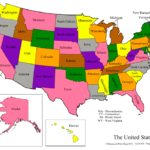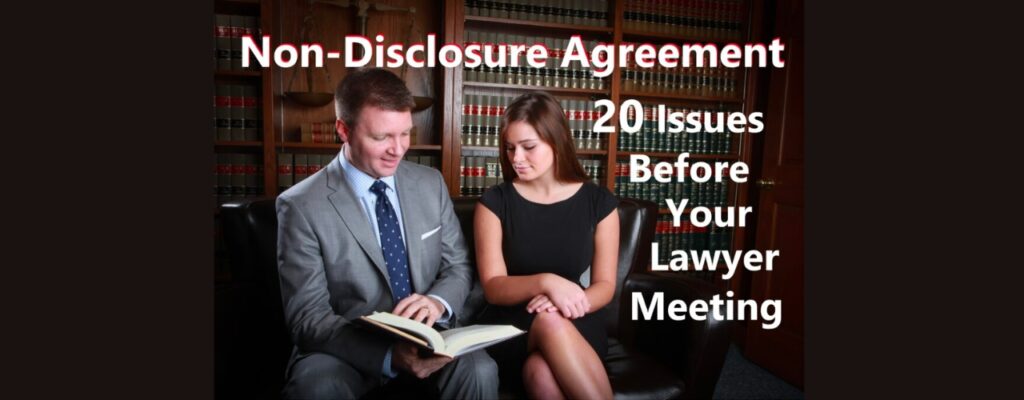THIS ARTICLE EXPLAINS THE STEPS TO CREATE A NON-DISCLOSURE AGREEMENT THAT ACTUALLY WORKS.
The purpose of having a non-disclosure agreement is for it to protect your business secrets. The only way to create a persuasive, effective NDA is through a lawyer with specific experience in NDAs. There are many little tricks and nuances that will ruin an NDA’s effectiveness. You’ll need a meeting with the non-disclosure agreement lawyer. This article anticipates the questions that will come up in your NDA lawyer meeting. Think through these issues in advance to make your NDA meeting a more effective use of your time and money.
- WAS THE BUSINESS RELATIONSHIP ESTABLISHED BEFORE ANY NON-DISCLOSURE AGREEMENT WAS SIGNED?

NDAs are often executed when the parties are exploring a potential business relationship. This may mean a stock purchase or sale. This may mean a merger or acquisition. Two businesses may be exploring a joint business venture. You will need to protect your business from misuse of its confidential information while the parties are exploring the business venture.
What is more, if a true partnership is contemplated, the parties must also be exploring the parameters of that partnership, the specifics, what to do and how it will be done. The ownership, handling, and use of confidential information must be part of those conversations. In these business situations, the non-disclosure contract becomes part of the framework that defines the relationship. The non-disclosure agreement protects the relationship from its genesis.
- HAS YOUR BUSINESS ALREADY SHARED ITS BUSINESS SECRETS?

Sharing confidential business information before a non-disclosure agreement is in place creates a real problem. Non-disclosure agreements and the laws that enforce them are forward thinking. This means it is difficult to protect a secret you have already “let out of the bag.” The common law, the Uniform Trade Secrets Act, RICO statutes, the Economic Espionage Act, patent laws, and trade secret laws require you to have made reasonable efforts to maintain your business’ secrets … secret.
The NDA, in essence, creates a contract that replaces the mandates of federal and state statutes. In its place, your non-disclosure contract protects your confidential business secrets and creates a remedy should they be disclosed.
All contracts must be supported by “consideration.” (The Restatement of Contracts, section 17(2)). A contract is likely unenforceable without consideration. Consideration cannot be a past performance, such as a pre-existing business relationship. What is more, under the law, by disclosing your business’ confidential information before a non-disclosure agreement is in place, your business has failed to take the reasonable efforts at the secrecy the law requires.
Do not hide from your attorney if this has occurred. There are ways to protect disclosed secrets. Failing to address a pre-NDA disclosure will only exacerbate it.
- CONDUCT A PRE-NON-DISCLOSURE AGREEMENT INVESTIGATION

Bad News: It may be that you should not want to disclose your confidential business information to this other party; whatsoever, irrespective of how enticing the prospects. The sooner you come to this realization, the better.
Good News: A pre-Non-Disclosure Agreement investigation may discover the “pressure points” of this other business and allow you to craft your Non-Disclosure Agreement so your Confidential Information stays secret, and profitable.

A pre NDA investigation is how this information is discovered so that it may be put to use.
- Does the other party have a history of failing to honor its agreements? A look through court filings, press releases, and other public information may reveal this.
- Is a Cease and Desist Letter likely to be effective?
- Does this business have a history of breaching its agreements?
- Would the other party be motivated by present/future employment issues for revealing your confidential information?
Pre-NDA investigation information is discoverable and will be important, not only in the drafting of your business contracts, but also in negotiations and how business is conducted with it.
- ENFORCEABILITY – CAN YOU ACTUALLY GET WHAT YOU MAY WIN AT ARBITRATION OR IN COURT?

The point of having a non-disclosure agreement is for it to actually protect your business secrets.
(1) This means it must convince whoever has your business’ secrets not to disclose them.
(2) Your business’ NDA has to be enforceable, in court, in a way that makes economic sense.
The problem with enforceability usually surrounds the disclosure to a foreign company. How are you going to enforce a U.S. judgment against a Chinese corporation? What is more, what if the assets of the company that misappropriates your business secret cannot be garnished through collection? Then, any judgment you receive for violating the NDA is “only worth the paper upon which it is written.” You must complete due diligence in advance on whether (as a practical matter) your non-disclosure agreement is enforceable.
5. IS THERE A SIZE, MONEY, POWER DIFFERENCE BETWEEN THE TWO PARTIES?
- Are you lured by the prospects of a wealthy merger / acquisition by a larger business?
- Do you dream of taking your business to the next level through a partnership with a giant?
- Is there a promise of advantages of a large company partnership?
Bring any contracts from the larger organization to your meeting for your NDA lawyer to closely scrutinize.

David vs. Goliath – Large organizations tend to disregard small businesses. This may result from the diffusion of responsibility within the larger business. This may result from a large entity “profit at all costs” culture. Whatever the root cause, there has always been a tradition of larger, more powerful parties profiting at the expense of the smaller party. This tradition persists to this day.
A small businesses must use caution when disclosing trade secrets and confidential business information. Has the larger company requested that you sign its non-disclosure agreement? Careful attention must be taken by an attorney experienced in NDAs. This is because hidden, or seemingly innocuous clauses can ruin a business.

It is an industry practice for contracts with one title to actually contain provisions, clauses, and mandates that do not fit within the boundaries of the contract title. It is also an industry practice for contract terms in a later contract to invalidate provisions from earlier contracts. This “trick” may be expressly spelled out in a paragraph. It may be hidden within an “entirety” clause, which is a clause stating the present contract between the parties is the whole agreement and all previous agreements are rescinded and invalid (boilerplate language with a punch!)
The economic reality of enforceability (should the larger company breach its agreement) must be considered. Can you afford to fight if the big company breaches? There is a large graveyard filled with businesses that failed to heed this caution.
- WHAT IS THE ROLE OF THE OTHER PARTY?

You will be asking your attorney to draft agreements and other documents to put your business in the most profitable, least risky position. Different types of parties create a need for different kinds of contracts. There are many types of non-disclosure agreements. Different NDAs should be used for different types of parties. Know all the categories of people to whom you will be discussing in advance. Try not to miss anyone.
- Is the other party an Independent Contractor?
- Is the other party an Intern?
- Is the protected information related to a Job Interview?
- Is this a Landlord/Tenant relationship?
- Is a Student the other party?
- Is a Visitor the other party?
- Is a Volunteer the other party?
The function of the other party will change the specifics of the non-disclosure agreement you must use.
- IS THE OTHER PARTY A POTENTIAL INVESTOR?

Reality Check: Do not expect a venture capital or other investor to sign a confidentiality agreement or a non-disclosure agreement. First, they feel that if it is necessary for you to disclose your confidential business secrets just to earn an investor, then the information and documents really are not “secrets” and it is not worth their money. Second, investors, especially venture capital investors see many proposals. They cannot be put in the position of having so many contracts “lording over them” as it creates a legal jungle. Luckily, the business risk of an investor or other venture capitalist disclosing your confidential business secrets in the absence of a non-disclosure agreement is small. If a venture capitalist had a reputation of disclosing to competitors, that investor would not be in business for long!
- IS THE SHARING OF YOUR COMPANY SECRETS FOR A SHORT TERM TRANSACTION OR AN ONGOING RELATIONSHIP?

Length of relationship time is a particular concern for non-disclosure agreements. Each non-disclosure agreement will include a time period where the duty not to disclose ends. You cannot simply draft a non-disclosure agreement that exists in perpetuity and never ends. A judge is likely to declare a never ending timeline unreasonable, and will either strike the entire agreement (very bad!) or impose a time period the judge deems reasonable, which may or may not harm your business.
The time period you choose should reflect the time sensitivity of your confidential business information.
For how long will your secrets be essential? Remember, your confidential information will be free to share with any entity, including your competitors, once the timeline of the NDA ends.
- IS A THIRD PARTY GOING TO SHARE IN YOUR SECRETS?

Explore whether the party to whom you are going to share your confidential information will share this information (intentionally or unwittingly) with persons or entities not a party to your non-disclosure agreement. Examples include:
- Contractors
- Consultants
- Vendors
Specific provisions for the handling of third-party recipients of your business secrets need to be looked into with particular care. It is normal for third party recipients to also do business with your competitors.
- THE TYPE OF YOUR BUSINESS SECRETS MATTERS
Make a list of the various categories of business secrets and confidential information you must protect. Make your list specific. Make your list complete. This is important for two reasons.
First, your non-disclosure agreement must specifically set out what is a secret and what is not. This is the single biggest mistake made in drafting NDAs. It is the most likely reason for your non-disclosure agreement to be invalidated.
Second, the laws that apply to your confidential business secrets differ. Your non-disclosure agreement attorney will need to know what statutes need to be addressed. Issues include:
- Is a Patent to be protected? Failure to use an NDA can affect the patent application.
- Is Software to be protected?
- Is Website Information to be protected?
- Are Movie Rights involved?
- Is a Business Plan included in the protected materials?
- Is Real Estate transaction information involved?
- Is Customer Information sought to be protected?
- Are Trade Secrets sought to be protected?
- Is the client’s financial information sought to be protected?
- Is medical information/medical records to be protected?
Create a specific list of all types of confidential business information prior to your meeting with your non-disclosure agreement attorney. It will make for a more efficient use of your money, and a more effective NDA.
- THE DEFINITION OF “CONFIDENTIAL” WILL BE YOUR BIGGEST CHALLENGE
I challenge you; search online. Download the first seventy-five non-disclosure agreements you find. Scroll to the definition of “confidential information.” Can you discern with any particularity what exactly “is” and “is not” confidential? No one can. That is the problem.

First, the other party to the contract will be unable to figure out what they are supposed to keep secret and what they can disclose. So, though well meaning, the attorneys who drafted those non-disclosure agreements have put their clients in an untenable position.
There is a second problem with a vague “confidential information” definition. A judge or an arbitrator must decide what to do with enforcing the non-disclosure agreement should a disclosure and claim result. The easy and practical decision will be to invalidate the entire non-disclosure agreement for being vague. Recall the two purposes of a non-disclosure agreement:
- Convince the other party to the NDA to keep your business secrets.
- Enforce the NDA to your benefit before an arbitration panel or a court of law.
Failing to create a specific but also thorough definition of what is “confidential information” is critical to realizing the purpose of your non-disclosure agreement. Your lawyer can help but cannot do it for you. Here are the parameters:
- Must be broad enough to cover your secrets
- Must be precise enough so everyone knows what is a secret and what is not
- Must be precise enough so a court will not conclude this information is already public
- Should all confidential documents be marked? Overuse can destroy enforceability. Underuse can cause the secrets to get out.
Do not shirk your responsibility to precisely define your confidential information.
- TRYING TO EXCLUDE WHAT CANNOT BE CONSIDERED CONFIDENTIAL MAY INVALIDATE THE NON-DISCLOSURE AGREEMENT

A number of statutes cover confidential business information that is protected as secret by non-disclosure agreements. One purpose of an NDA is to achieve additional protections beyond that conferred by trade secret statutes. Though this is true, non-disclosure agreements still exist within the legal space of the statutes, regulations, and common law pertaining to confidential business secrets.
Confidential trade secret laws require (1) your business secrets to actually be secrets, and (2) you to take reasonable steps to preserve your secrets. Thus, non-disclosure agreements are unlikely to protect certain types of information. These include:
- Information publicly known or in the public domain prior to the time of disclosure
- Information publicly known and generally available after disclosure through no action or inaction of the recipient. Information that is protected and unknown, but becomes known during the pendency of the agreement.
- Information already known, already in the possession of the recipient prior to the NDA.
- Information obtained by the recipient from a third party without breach of confidentiality.
- Information independently developed by the recipient.
Look through the information you seek to protect in your non-disclosure agreement. Edit out the information that meets the above criteria.
Why not include it anyways? The reason is that you do not want a future arbitrator or judge to invalidate your non-disclosure agreement based on these types of deficiencies. Remember, “the poison apple can spoil the bunch!”
- TIME – HOW LONG WILL YOUR COMPANY SECRETS BE VALUABLE?

What is the shelf life of your company’s secrets? Bear in mind that in creating a non-disclosure agreement, it has an end date. Whomever you disclose your confidential information to can use your secrets after your NDA contract expires.
Some information should be protected forever. The most cited example is Coca-Cola’s secret formula. It has been kept a secret for over 100 years, yet still remains out of the public eye. Coca-Cola does not secret its formula using a non-disclosure agreement. Other information should elapse earlier. Consider segmenting out in different categories your business’ confidential information with different time durations.
- DO YOU ANTICIPATE SOME LEGAL PROCESS WILL REQUIRE THE OTHER PARTY TO DISCLOSE YOUR SECRETS?
Often NDAs will carve out from the obligation not to disclose confidential information “as required by law.” It is important to understand what is being carved out under that exception so you know when you may disclose information the other party designates as “confidential” and when the other party can disclose information you designate as “confidential.”

There are exceptions when confidential information must be disclosed. Make sure your non-disclosure agreement carves out these exceptions to your definition of business secrets so that the lack of a carve out does not spoil other portions of the non-disclosure agreement. These include:
- A court ordering the disclosure of the information,
- An Audit,
- A Lawsuit, Federal Rule 26 disclosures or state discovery orders,
- A whistleblower statute, such as 5 U.S.C. § 7211 (governing disclosures to Congress),
- Disclosures of illegality, waste, fraud, abuse or public health or safety threats, like through 5 U.S.C. § 2302(b)(8),
- State laws about disclosure of unlawful workplace activity, like California’s Government Code § 12964.5,
- A government investigation, and
- SEC contact, such as Commission Rule 21F-17(a) prohibiting any person from taking any action to prevent you from contacting the SEC directly to report a possible securities law violation.
To address these risks, make sure your NDA lawyer drafts a specific conspicuous clause in the non-disclosure agreement that the other party has a duty to provide notice of any legal obligation to disclose. There should also be written in a time period to raise objections for a legal process requiring disclosure.
- WHAT REMEDY WILL SUFFICE IF THEY DISCLOSE YOUR BUSINESS SECRETS?

There are economic realities that harm businesses through the disclosure of confidential business information but still prevent a practical remedy because of the time and cost of litigation. Make sure you discuss various remedy provisions within the non-disclosure agreement. These include:
- Injunctive relief with notice
- Injunctive relief without notice
- Attorney’s fees
- Litigation costs
- Liquidated damages clause
Drafting damages and remedy clauses into your business non-disclosure agreement may make the difference between keeping your business secrets and losing them.
- WHAT LAWS AND LOCATION WILL APPLY?

There are rules, known as “Choice of Laws” provisions and “Venue” statutes that determine the physical location of any dispute. Venue can be the location of the parties. It can be the location of where the “bad act” occurred. It can be the location of where the damage occurred.
You may or may not want to litigate a breach of contract lawsuit in one or more of these locations. The laws may benefit or harm your chances. You may not prefer the legal system in a particular location. It may not make economic sense to litigate in a remote location.
Contract provisions in a non-disclosure agreement can determine which laws apply. Contract provisions can choose the location of arbitration or litigation, should a dispute arise. Consider location and laws in advance of drafting a non-disclosure agreement to sidestep these problems.
- DO YOU WANT TO FIGHT IT OUT IN COURT OR ARBITRATE?

Contract laws can permit arbitration or mandate any disputes be decided by a court of law. Prepare to discuss in advance the benefits and detriments of arbitration with your non-disclosure agreement attorney so you may decide whether to include an arbitration provision.
- WHAT MUST BE DONE WITH THE CONFIDENTIAL INFORMATION AND DOCUMENTS AFTER THE RELATIONSHIP ENDS?
Few relationships last forever. It is likely your business relationship with this other entity will at some point end. At that time, the issue will arise. What should be done with the confidential information shared between the parties? Choices include:
- Giving all information and documents back
- Destroying all confidential documents an information
- Keeping the information and documents
Remember, there may be practical problems regarding whether destruction or return is practicable. Put thought into what you wish the other party to do with your secrets once the business relationship ends.
- WHO WILL OWN NEW SECRETS THAT THE PARTIES COME UP WITH DURING THE RELATIONSHIP?
Watch out for proposed provisions that may result in a transfer of ownership of proprietary information. For example, a provision that a party disclosing a document will own any and all information in that document may give the counterparty an argument that it owns your information because it disclosed a document containing your information to you. The NDA should address which party will own any intellectual property derived from information disclosed by the parties (assuming the NDA contemplates the creation of intellectual property).
BONUS ISSUE TO COVER: RESIDUAL INFORMATION

Place care into “residual information” clauses. Residual information clauses in non-disclosure agreements address new ideas derived from confidential information as their foundation. They are also known as “Leftovers, or Remains.”
They are ideas generated and left over after the business relationship is done. They are generated as bits and pieces of information the receiving party retains through memory long after the project or business deal is complete. Some knowledge naturally retained simply cannot be forgotten.
- A “residuals clause” permits the recipient of confidential information to continue to use any information retained in the unaided memory of the recipient’s employees after they return any tangible confidential information to the discloser.
- Unless a residuals clause is removed or significantly modified, it can be devastating to the disclosing party’s business. Think about providing “I know it when I see it” type of trade secret information to a party under an NDA that has a broad residuals clause. You may have just given away your key trade secret.
- Enforceability of residual information ownership is the problem. The lack of enforcement may bleed into other areas.
IN SUMMARY
Non-disclosure agreements are too often treated as a “check box” item as if they are all essentially the same. This attitude only benefits the wrongdoer who would steal your business secrets for their benefit and your harm. Invest time, thought, and money into the creation of this essential business contract.
Vet the attorney you use to draft your non-disclosure agreement to ensure the lawyer has specific experience. Calendar time to go over the issues in this article with your non-disclosure agreement lawyer after thinking them though. You will find peace of mind and the benefits of lower business secret risk as your reward.



